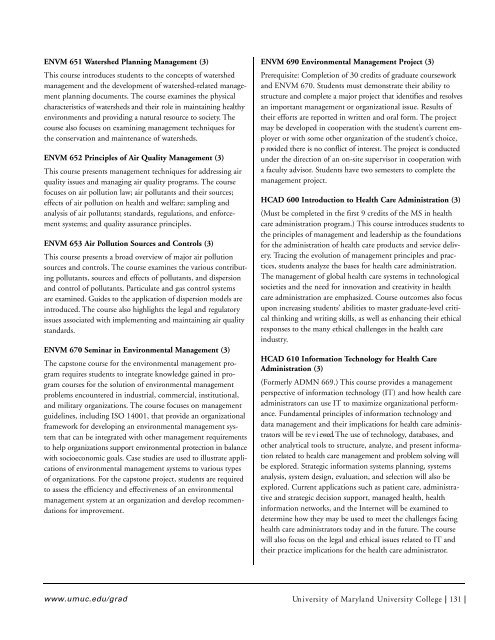A+B. Intro_SJ.1 - University of Maryland University College
A+B. Intro_SJ.1 - University of Maryland University College
A+B. Intro_SJ.1 - University of Maryland University College
You also want an ePaper? Increase the reach of your titles
YUMPU automatically turns print PDFs into web optimized ePapers that Google loves.
ENVM 651 Watershed Planning Management (3)<br />
This course introduces students to the concepts <strong>of</strong> watershed<br />
management and the development <strong>of</strong> watershed-related management<br />
planning documents. The course examines the physical<br />
characteristics <strong>of</strong> watersheds and their role in maintaining healthy<br />
environments and providing a natural re s o u rce to society. T h e<br />
course also focuses on examining management techniques for<br />
the conservation and maintenance <strong>of</strong> watersheds.<br />
ENVM 652 Principles <strong>of</strong> Air Quality Management (3)<br />
This course presents management techniques for addressing air<br />
quality issues and managing air quality programs. The course<br />
focuses on air pollution law; air pollutants and their sources;<br />
effects <strong>of</strong> air pollution on health and welfare; sampling and<br />
analysis <strong>of</strong> air pollutants; standards, regulations, and enforcement<br />
systems; and quality assurance principles.<br />
ENVM 653 Air Pollution Sources and Controls (3)<br />
This course presents a broad overview <strong>of</strong> major air pollution<br />
sources and controls. The course examines the various contributing<br />
pollutants, sources and effects <strong>of</strong> pollutants, and dispersion<br />
and control <strong>of</strong> pollutants. Particulate and gas control systems<br />
are examined. Guides to the application <strong>of</strong> dispersion models are<br />
introduced. The course also highlights the legal and regulatory<br />
issues associated with implementing and maintaining air quality<br />
standards.<br />
ENVM 670 Seminar in Environmental Management (3)<br />
The capstone course for the environmental management program<br />
requires students to integrate knowledge gained in program<br />
courses for the solution <strong>of</strong> environmental management<br />
problems encountered in industrial, commercial, institutional,<br />
and military organizations. The course focuses on management<br />
guidelines, including ISO 14001, that provide an organizational<br />
framework for developing an environmental management system<br />
that can be integrated with other management requirements<br />
to help organizations support environmental protection in balance<br />
with socioeconomic goals. Case studies are used to illustrate applications<br />
<strong>of</strong> environmental management systems to various types<br />
<strong>of</strong> organizations. For the capstone project, students are required<br />
to assess the efficiency and effectiveness <strong>of</strong> an environmental<br />
management system at an organization and develop recommendations<br />
for improvement.<br />
ENVM 690 Environmental Management Project (3)<br />
Prerequisite: Completion <strong>of</strong> 30 credits <strong>of</strong> graduate coursework<br />
and ENVM 670. Students must demonstrate their ability to<br />
s t ru c t u re and complete a major project that identifies and re s o l ve s<br />
an important management or organizational issue. Results <strong>of</strong><br />
their efforts are reported in written and oral form. The project<br />
may be developed in cooperation with the student’s current employer<br />
or with some other organization <strong>of</strong> the student’s choice,<br />
p rovided there is no conflict <strong>of</strong> interest. The project is conducted<br />
under the direction <strong>of</strong> an on-site supervisor in cooperation with<br />
a faculty advisor. Students have two semesters to complete the<br />
management project.<br />
HCAD 600 <strong>Intro</strong>duction to Health Care Administration (3)<br />
(Must be completed in the first 9 credits <strong>of</strong> the MS in health<br />
care administration program.) This course introduces students to<br />
the principles <strong>of</strong> management and leadership as the foundations<br />
for the administration <strong>of</strong> health care products and service delivery.<br />
Tracing the evolution <strong>of</strong> management principles and practices,<br />
students analyze the bases for health care administration.<br />
The management <strong>of</strong> global health care systems in technological<br />
societies and the need for innovation and creativity in health<br />
care administration are emphasized. Course outcomes also focus<br />
upon increasing students’ abilities to master graduate-level critical<br />
thinking and writing skills, as well as enhancing their ethical<br />
responses to the many ethical challenges in the health care<br />
industry.<br />
HCAD 610 Information Technology for Health Care<br />
Administration (3)<br />
(Formerly ADMN 669.) This course provides a management<br />
perspective <strong>of</strong> information technology (IT) and how health care<br />
administrators can use IT to maximize organizational performance.<br />
Fundamental principles <strong>of</strong> information technology and<br />
data management and their implications for health care administrators<br />
will be re v i ewed. The use <strong>of</strong> technology, databases, and<br />
other analytical tools to structure, analyze, and present information<br />
related to health care management and problem solving will<br />
be explored. Strategic information systems planning, systems<br />
analysis, system design, evaluation, and selection will also be<br />
explored. Current applications such as patient care, administrative<br />
and strategic decision support, managed health, health<br />
information networks, and the Internet will be examined to<br />
determine how they may be used to meet the challenges facing<br />
health care administrators today and in the future. The course<br />
will also focus on the legal and ethical issues related to IT and<br />
their practice implications for the health care administrator.<br />
w w w. u m u c . e d u / g r a d<br />
Un i versity <strong>of</strong> Ma r yland Un i versity <strong>College</strong> | 131 |

















